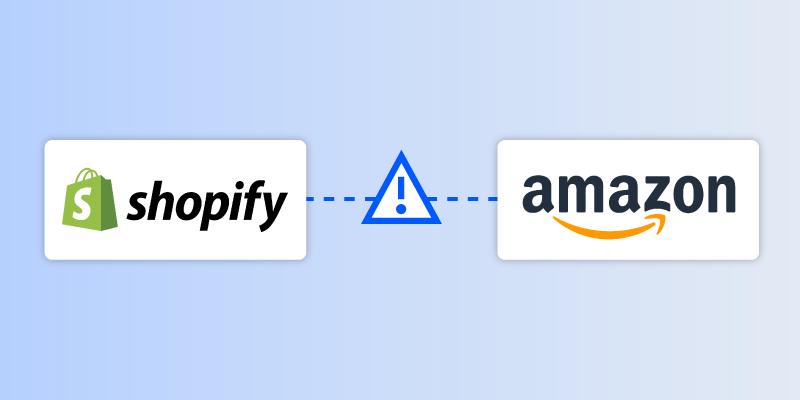As of September 2021, Shopify no longer offers support for syncing to the native Amazon sales channel. In order for merchants to upload products and link Shopify to Amazon, they now require a third-party solution.
There are other cheap product listing alternatives available to Shopify merchants, but they often come with major limitations.
Merchants who used the native Amazon sales channel from Shopify faced difficulties with catalog optimization, error resolution, and creating product variations. In order to properly optimize listings, merchants had to invest in other tools or do it manually, which is time-consuming if you have numerous SKUs.
Many of the cheaper Shopify to Amazon integration alternatives also offer limited to no customer support. If your product upload is unsuccessful, there isn’t a lot you can do about it besides manually combing through your data to see what went wrong. Even if you list your products successfully, you don’t have any support to fall back on if issues arise.
This lack of flexibility and expert support means that you have less control over your data, so you’re not maximizing your potential for better product discoverability and conversions.
Transitioning to cheaper alternatives to fill this new gap in your retail strategy may make sense for your business now, but investing in a more robust Amazon and Shopify integration solution can help you grow your business in the long run.
With a more powerful integration system, merchants have access to tools that make listing on marketplaces a more seamless process. When the time is right for you to expand your ecommerce business, having feed support and a flexible platform with existing integrations with sales channels pays off. Not only will you be able to link your Shopify to Amazon, but you’ll be able to integrate your store with multiple marketplaces as you scale.
Unlike the basic Shopify app, a more robust data feed management solution gives you the most control over your product data from Shopify. Not only can you update and sync your product listings, you can also implement ongoing data optimizations and categorize your products accurately so that they reach the right shoppers. For a merchant with a large product catalog and a lot of orders, managing a marketplace integration manually can be extremely tedious and time-consuming without help.
Feedonomics can help you fill this new gap in your data management. Our full-service solution for marketplaces gives merchants more control over their data, as well as access to 24/7 support. Merchants rely on our marketplace specialists to build product feeds in accordance with Amazon’s best practices and help resolve feed-related errors quickly.
Our platform also helps with marketplace order management. Feedonomics automatically inserts orders from Amazon to Shopify and sends processed orders from Shopify back to Amazon
Listing on Amazon is part of a larger marketplace strategy Feedonomics can help you execute. Our full-service solution gives merchants access to tools that enable them to expand to even more channels from a single platform. We handle complex integrations, optimize listings to improve performance, and support your business with dedicated marketplace specialists and feed managers.
While losing the Shopify to Amazon app integration is a new challenge for merchants to overcome, it doesn’t have to hinder your marketplace expansion. Find out how Feedonomics can help optimize and list your products on Amazon today.

With its leading data feed management platform, Feedonomics helps brands, retailers, and agencies optimize and list products on hundreds of shopping destinations around the world. Learn more about our full-service solutions for advertising channels and marketplaces.




